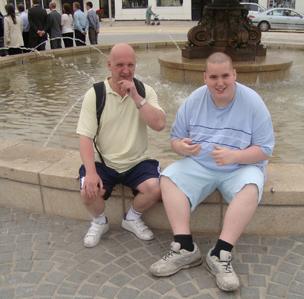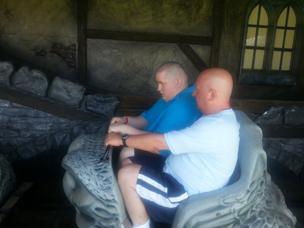Viewpoint: 10 jargon phrases used for my autistic son
- Published
- comments

Mark and Steven Neary
My son Steven is 23. He has autism and other learning difficulties. And the language of the social care system seems to make his life sound even less "normal" than it is.
The adult social care world is about many things, but one thing that I feel it's not about is care. The language seems to mislead you right from the start. Processes seem to come before people in a system of impenetrable management where money is the biggest consideration.
Day centres are closed down. Although you may have considered them a helpful lifeline, this closure is not a negative thing because it's been done to promote independence.
Service user choice is also a fabulous phrase until you find it results in being given a sum of money to purchase your own care provider but no one provides care at those rates which are calculated for you by a fairer charging policy. Which also sounds good but isn't.
Steven was transitioned into adult services six years ago. Soon after, he was taken into a care unit against all our wishes which resulted in a well-documented court case (Autistic man unlawfully detained, June 2011).
One of the unit's ideas was that he should have a person-centred plan. He had to create a wish list, and came up with six things:
Live at home with Dad
Go on holiday to Somerset
Have Christmas presents at home
See Toy Story 3 at the cinema
Have breakfast in the bacon shop
Go swimming at Hampton open-air pool
All six wishes were refused because they were not considered to be in his best interests. To me, that's not a person-centred plan, that's a system-centred plan.
A service user, like Steven, is a case and every piece of minutiae from his life must be recorded and analysed. For two years I had to keep logs of everything my son did. I still have 565 sheets of paper, all saying: "Steven had pears, grapes, bananas and oranges for breakfast." For 126 consecutive Mondays, a support worker recorded "Steven watched a Mr Bean DVD with his father."
I was never once asked to hand over the logs I'd written.
One manager explained to me once that everything learning disabled people do must have a value - not too bad until you realise that someone else is setting the value and its parameters are very narrow. Who on high decreed that everything we do must have some value?
I write a lot about the language of the social care world. I love it when I read stuff like transparency because the reality seems to be the opposite. I therefore tend to work on the principle that the opposite of what is being presented is probably closer to the reality.
But the thing that really gets my goat is when a person's entire life, everything they do, is jargonised.
I was recently comparing with a friend the way I present the everyday norms of my own life with the way the social care world presents Steven's life. We were having the conversation in a pub. If Steven were to go to that pub, or to a gym or swimming pool, for instance, he might be described as accessing the community.
Here are 10 jargon phrases I jotted down on the back of a beer mat, the kind of things which make Steven's life sound even less "normal":
1. I live in my home. Steven's current placement is in the family home.
2. When I make a pizza, I'm making a pizza. When Steven makes a pizza, he's increasing his independence skills (as overseen by an occupational therapist).
3. If I cry, I'm sad about something. If Steven cries, it is logged and analysed by the psychologist and positive behaviour team.
4. If I shout or swear, I'm angry about something. If Steven shouts or swears, it is challenging behaviour and new behaviour management plans need to be drawn up.

Acessing the community aka a day at a theme park
5. If I choose between steak or fish for my tea, I'm making a choice. If Steven chooses either steak or fish for his tea, he is being empowered.
6. I have friends. Steven has a circle of support and influence.
7. If I'm asked what I want to do with my free time, I'm planning my hobbies. If Steven is asked what he wants to do with his free time, it's his person-centred plan.
8. If I make an unwise choice, I've messed up. If Steven makes an unwise choice he may be lacking mental capacity.
9. If I sort my CDs into alphabetical order, I'm being a bit anal. If Steven sorts his Mr Bean DVDs into colour order, he is being inappropriately obsessive.
10. If I eat two Mars bars, I'm being a pig. If Steven eats two Mars bars, he is challenging boundaries.
Mark Neary's Love, Belief and Balls blog, external
You can follow Ouch on Twitter, external and on Facebook, external